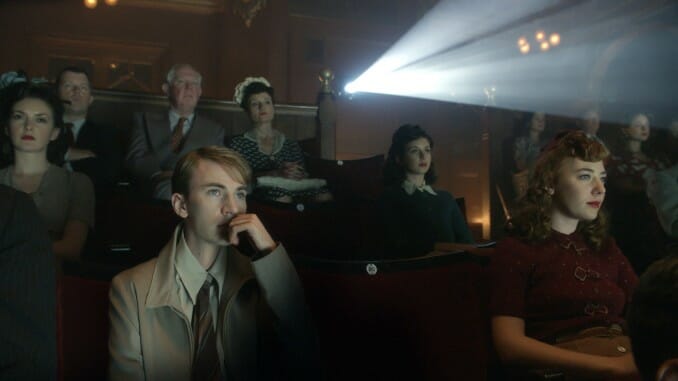Captain America: The First Avenger Gave the MCU Its First Hero You Could Believe In

Before Joe Johnston’s Captain America: The First Avenger, the heroes of the MCU had been of a certain type. They started out flawed, not quite ready for heroics, and over the course of their films, they learned a lesson and developed into very cool, very manly heroes. In Iron Man, Tony Stark needed to come to terms with the consequences of his past actions. Thor was temporarily banished from his own world and kingdom for being headstrong and too willing to rush into war. Hulk was a rage machine, destroying everything in his path. There’s also the issue of the characters themselves, who all had great callings and purposes in their regular lives. Tony Stark was not only born rich but also gifted with extraordinary intelligence and ability. Thor was born to be a king. Bruce Banner was a genius before he ever became the Hulk. Steve Rogers has no such pedigree.
In The Avengers, Tony even makes the point that everything special about Steve came out of a bottle. The other heroes are the special, exceptional men who lead different lives from regular folks. They are badasses and, in a way, their lives are aspirational. People want to be Iron Man. They want Tony’s resources and abilities. They want Thor’s power, and if they don’t want to be the Hulk, then they at least envy the power to do what he can do. So how does Chris Evans’ Steve Rogers, one of maybe two of the MCU’s actually earnest characters, fit into this paradigm?
Captain America isn’t cool. He doesn’t drive a red sports car or have awesome lightning skills. His concept is a little on the hokey side, even for superheroes, and he just does what a regular guy can do, but a little better. The First Avenger doesn’t lean into the potential coolness of the character (though his coolness is highlighted in later movies, starting with The Winter Soldier). Instead, the movie goes out of its way to show how uncool and down on his luck he is, portraying him as a regular, slightly awkward man. Things just don’t come easy for him like they do for Bucky Barnes, his handsome, tall and charming best friend. Steve may have his values and plenty of guts, but he also gets the crap kicked out of him all the time.
When Marvel Studios started the MCU, they were reinventing the superhero for a more modern age. It was smart to make these characters cool and just a little bit aggressive. Nobody really wanted to watch a paragon of virtue punching Hitler on the jaw. What was popular in 2011 was gritty movies about characters going up against the overwhelming darkness of the world. It was the year of Hanna and Drive and The Deathly Hallows. Even the poster for The First Avenger made the film seem a little grittier than it actually ended up being, with its desaturated colors and Steve’s ultra-serious expression. By making the majority of their characters fit into this gritty world paradigm, the MCU tapped into this trend and gave these flawed characters somewhere to grow, letting the audience follow their paths as they unfurled into heroes on the screen. It made for good drama and let the audience really connect with characters who maybe weren’t perfect all the time. But it was equally smart to, after establishing this new norm, invert the superhero into something that someone already is, as opposed to something that one stumbles into.
Even before Steve Rogers got his powers, he behaved like a hero. The powers given to him by the super serum only allowed him to fit the paradigm a little more traditionally. He didn’t need to learn to harness his strength or treat people well or stop warmongering. In fact, who he is at the beginning of the movie is why he is chosen to become Captain America. When asked about why Steve wants to go to fight in the war so badly, Steve replies, “I don’t want to kill anyone. I don’t like bullies. I don’t care where they’re from.”
This is a quintessential Captain America quote, and it happens before Steve gets the serum and officially becomes a “hero.” Steve Rogers isn’t learning how to manage his great power; he’s deserving of it before he gets it. And that’s different from what had come before. When Dr. Erskine (Stanley Tucci) tells Steve, “Well, there are already so many big men fighting this war. Maybe what we need now is the little guy, huh?” he might be speaking about the MCU at that point in time. As much of a relic as Captain America is, he represents something new in this line of films and the kind of heroism seen on screen over the few years before The First Avenger came out. He wasn’t an antihero fighting through the darkness, trying to hold onto his soul throughout the way. He was just a good guy, so good that he made the dark seem less impossible to overcome.
-

-

-

-

-

-

-

-

-

-

-

-

-

-

-

-

-

-

-

-

-

-

-

-

-

-

-

-

-

-

-

-

-

-

-

-

-

-

-

-








































